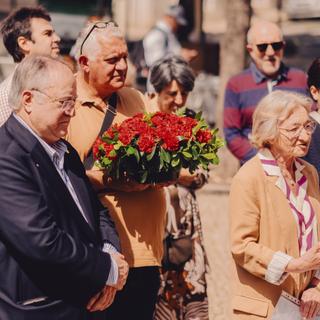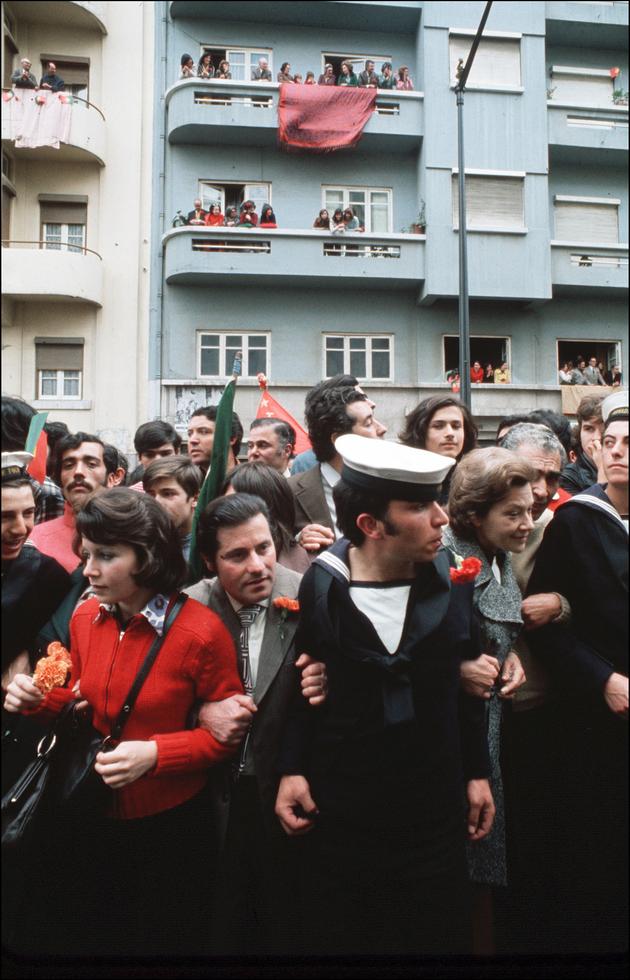


50 years ago, the Carnation Revolution ended Portugal's dictatorship in one night
Long ReadOn April 25, 1974, the Portuguese military overthrew Antonio de Oliveira Salazar's authoritarian regime. Fifty years later, participants and witnesses tell Le Monde about those few hours during which the old world gave way to the new.
Fifty years on, the chip is still there, a rare physical trace of a revolution that swept away 48 years of Portuguese dictatorship in less than 24 hours: a discreet notch, barely 50 centimeters high, cut into the stone posts lining the entrance to the National Republican Guard (GNR). The building's façade overlooks the charming Carmo Square in central Lisbon. How many tourists strolling through the square know that a military coup fomented by a handful of young captains turned into a popular revolution on April 25, 1974?
That day, at around 7:30 pm, a Portuguese-built light armored vehicle, the Chaimite Bula, left the GNR, damaging the stones of the porch, which were too close together to let it pass. The square was packed with people, the more agile even perched on the trees to catch a glimpse of the scene. A few minutes earlier, the machine had reversed to pick up a passenger. That man, who would spend the rest of his life in exile, was Marcelo Caetano, the last prime minister of the far-right regime founded by Antonio de Oliveira Salazar in 1933. He climbed into the vehicle after uttering a single sentence, later reported by the driver: "That's life." At the end of an afternoon of endless talk and delays, the former academic surrendered, formally handing over his powers to the insurgents. The Estado Novo ("New State") was no more.
In the space of one night and one day, the revolution – not yet known as the "Carnation Revolution" (it owes its name to the flowers distributed to soldiers by a Lisbon merchant, who then placed them in the barrels of their rifles) – was about to change the lives of the Portuguese people. Thanks to it, 8.7 million citizens regained a freedom that most had never known. It also put an end to the interminable colonial wars (in Mozambique, Angola and Guinea) that had been exhausting the country for 15 years.

Since then, Portugal long seemed inoculated against the far right, which had virtually disappeared from the political scene. But history has its ironies. In the parliamentary elections held on March 10, a month and a half before the 50th anniversary commemorations, this Portuguese exception came to nothing: With 18% of the vote, the far-right Chega ("that's enough") party, created five years earlier, profoundly reshuffled the parliamentary landscape. It was a real shock, in a country where many still cherish the memory of their revolution.
In reality, the months leading up to democracy, in 1976, were not all plain sailing, far from it. After the euphoria of the early days, when intellectuals and artists from all over the world flocked to Lisbon, the so-called "Ongoing Revolutionary Process" (PREC) went through chaotic times, marked by three attempted coups (one conservative, one far-right and one far-left), endeavors for direct democracy and, on the whole, chronic instability. Many hopes were shaken at the time.
You have 85.46% of this article left to read. The rest is for subscribers only.
